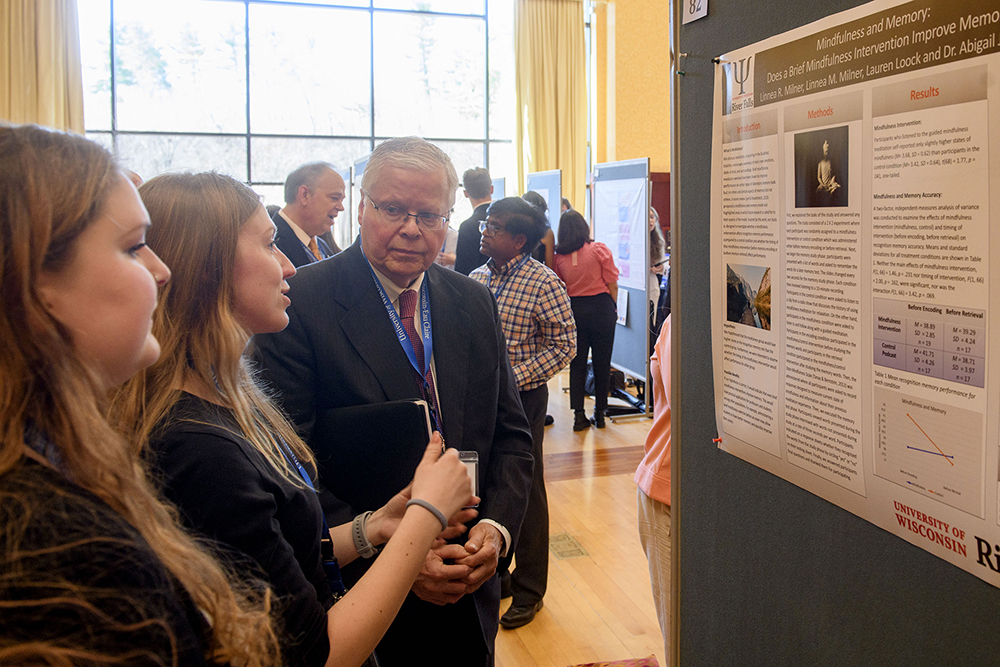
UW System President Jay Rothman converses with UW-River Falls students Lauren Loock, center, and Linnea Milner Thursday as they presented their work during the National Conference of Undergraduate Research at UW-Eau Claire. Bill Hoepner photo.
Undergraduates discuss, display their expertise to a large audience
As soon as Ali Thome-Hough and Emma Etten entered the large room where they would present their research as part of the National Conference on Undergraduate Research (NCUR) Friday morning, they knew this wasn’t just any event.
The duo, University of Wisconsin-River Falls students, instantly noticed the loud din of hundreds of voices talking at once in a tightly packed space at the University of Wisconsin-Eau Claire’s Davies Student Center. Thome-Hough and Etten, both seniors majoring in animal science, were among 3,500 college students and faculty from 45 states and six foreign countries attending the conference April 13-15. About 30 UWRF students presented research at the event.
“The buzz of energy I felt when I walked into that room, it was amazing,’” Thome-Hough, of Madison, said. “There were so many people there, all discussing their research at once.”
Thome-Hough and Etten were soon discussing their research with faculty and students moving through the room. They talked about planning their project, which measures to what degree electromagnetic therapy helps horses heal and better tolerate pain and pressure. They described the testing process and challenges working the frequent testing required into their busy class schedules.
Any nerves they felt leading up to their presentations melted away as they discussed their research with others, they said. Visitors to their research poster location asked questions and offered positive feedback.
“When you talk about your work with other people, you realize you really know what you’re talking about,” Etten, of Shawano, said. “It builds your confidence.”
That message is music to the ears of Molly Gerrish, director of Undergraduate Research, Scholarly and Creative Activity at UWRF. Student research projects not only help students better understand their study subjects, but the presentations build confidence, she said.
“This kind of research really elevates students’ mindset,” Gerrish said. “When they present their work, to see their confidence grow, it’s really amazing and gratifying.”
Students also benefit from networking with their peers and faculty from other schools, Gerrish said. Those connections don’t happen unless students attend such research forums as NCUR, she said.
Wesley Chapin, UWRF associate vice chancellor for academic affairs and graduate studies, praised student research projects and the assistance of faculty who work with students on their projects. Students and their faculty mentors spent months or sometimes multiple years on research.
“The faculty really show their dedication to these students through these research projects,” Chapin said.
UWRF Physics Professor Lowell McCann played a significant role in Tori Gehling’s research on aerosols and their impact on climate change. In fact, Gehling said, without McCann’s guidance, she wouldn’t have been presenting her work at NCUR at all.
“He’s the reason I’m doing this in the first place,” Gehling, a junior physics major from St. Cloud, Minn., said Saturday following a presentation of her project. “His positive feedback about my work has made such a difference and helped me get to the point where I can present research like this.
‘You learn so much’
Nicole Hetletved, a senior psychology major from Hammond, credited Melanie Ayres, chair of the UWRF Psychology Department, with assisting on her research studying the impacts on caregivers on forming bonds with terminally ill patients. Hetletved’s work hits close to home: her mother was diagnosed with a terminal illness several years ago.
Thankfully, Hetletved’s mom is still alive, her diagnosis having changed from terminal to chronic, thanks not only to advancements in her medical treatments but likely also because of positive relationships with her caregivers, Hetletved said.
“There can be positive outcomes for both patients and caregivers by forming these relationships,” she said. “To have my research show that is possible feels amazing.”
Emma Augustine and McKinley Davis, seniors double majoring in psychology and neuroscience, partnered on research studying the impact of nicotine on adolescent mice when they are isolated. Their project may have applications for teenage humans and whether they’re more likely to use alcohol and drugs to deal with feelings of stress isolation.
They discussed their research with passersby, describing the responses of the 67 mice they tested, and how adolescent mice showed a strong preference for nicotine quickly, much more so than adult mice tested. Augustine, from Ellsworth, and Davis, from Menomonie, said they plan to forward their research for others at UWRF to study further.
“You learn so much by doing these kinds of projects,” Davis said, “and you learn how to present your work to others. That only helps us after we graduate.”
Many UWRF participants in NCUR are graduating in May and will head off to graduate school. Others will go into the workforce, while still others will return to UWRF to continue their studies. No matter what they do, students benefit from being part of research programs and presenting their work to others, both Gerrish and Chapin said.
“These research projects represent next-level learning,” Gerrish said. “This kind of work, it makes our students realize that they are scholars in their field, that they are contributing to the knowledge base. It contributes to our students being able to go out and make a positive difference in the world.”
Written by UW-River Falls University Communications and Marketing
Link to original story: https://www.uwrf.edu/News/Students-showcase-their-research-at-national-conference.cfm
